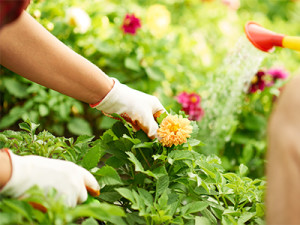 It’s always been wise to conserve water in your home and garden, but conservation is more than just a good idea — it’s essential. We need to stretch our water supplies to insure that there is enough water to serve everyone who needs it.
It’s always been wise to conserve water in your home and garden, but conservation is more than just a good idea — it’s essential. We need to stretch our water supplies to insure that there is enough water to serve everyone who needs it.
One of the best places to make significant reductions in water use is in your garden. People who live in urban areas use about half of their water outdoors. In the summer, garden water use climbs even higher as the weather gets hotter and drier.
Fortunately, you can save water in your garden without sacrificing the quality of your landscaping. By taking advantage of efficient irrigation techniques and using ornamental plants and ground covers that are suitable to long, dry summers, you can enjoy a beautiful landscape that requires significantly less water and maintenance than a less carefully designed one.
Planting Hints
- Whenever possible, plant only low-water and drought-resistant plants.
- Limit the amount of area devoted to your lawn. Lawns need great quantities of water, particularly in the summer.
- Wait until fall or winter to install a new garden. New plantings require more water than established growth.
- Keep low-water plants away from “thirsty” plants. Mediterranean-zone plants can suffer if they are over watered as you care for their neighbors.
- Keep shade plants in the shade. This will help prevent them from drying out.
- Place water-loving plants at the bottom of slopes, where they will benefit from water runoff.
- Include mulch around shrubs and plants to help reduce evaporation, limit weed growth, moderate soil temperature, and prevent erosion.
More Outdoor Savings
- A good way to check if your lawn needs watering is to just step on the grass. If it springs right back up, you don’t need to turn on the sprinklers. When it’s time to water, do it at dawn or dusk to reduce evaporation.
- Check your sprinkler system regularly. A sprinkler system can waste water if sprinkler heads are broken, automatic timers are not adjusted for rain, or hidden leaks are not detected.
- A garden hose can use 10 gallons of water per minute. Use a broom instead of a hose to clean patios, walkways, and driveways. When you do need the hose, use a nozzle to increase pressure and decrease water usage.
- Replace mulch around shrubs and plants at least once per year and remove weeds as needed.


